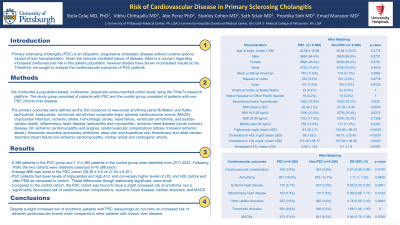Monday Poster Session
Category: Liver
P2394 - Risk of Cardiovascular Disease in Primary Sclerosing Cholangitis
Monday, October 23, 2023
10:30 AM - 4:15 PM PT
Location: Exhibit Hall

Has Audio
- SC
Stela Celaj, MD, PhD
University Pittsburgh Medical Center
Pittsburgh, PA
Presenting Author(s)
Stela Celaj, MD, PhD1, Vibhu Chittajallu, MD2, Jaime A. Perez, PhD3, Stanley M. Cohen, MD2, Seth Sclair, MD2, Preetika Sinh, MD4, Emad Mansoor, MD2
1University Pittsburgh Medical Center, Pittsburgh, PA; 2Case Western Reserve University / University Hospitals, Cleveland, OH; 3University Hospitals Clinical Research Center, Cleveland, OH; 4Medical College of Wisconsin, Milwaukee, WI
Introduction: Primary sclerosing cholangitis (PSC) is an idiopathic, progressive cholestatic disease without curative options except of liver transplantation. Given the immune mediated nature of disease, there is a concern regarding increased cardiovascular risk in PSC, however studies so far have shown inconsistent results. Thus, we sought to analyze the risk of cardiovascular events in PSC
Methods: We conducted a multicenter, propensity score-matched (PSM) cohort study using the TriNeTx research network. The study group consisted of patients diagnosed with PSC and the control group of patients with chronic liver disease never diagnosed with PSC. The primary outcomes were defined as the first incidence of new-onset arrythmia(atrial fibrillation and flutter, tachycardia, bradycardia, ventricular arrhythmia), composite major adverse cardiovascular events (MACE) (myocardial infarction (MI), ischemic stroke, hemorrhagic stroke, heart failure, ventricular arrhythmia, sudden cardiac death), inflammatory heart disease (pericarditis, myocarditis), ischemic heart disease (acute coronary disease, MI, ischemic cardiomyopathy, angina), cerebrovascular complications (stroke, transient ischemic attack), thrombotic disorders (pulmonary embolism, deep vein and superficial vein thrombosis) and cardiac disorders (non-ischemic cardiomyopathy, cardiac arrest, cardiogenic shock). We performed 1:1 PSM using a greedy nearest-neighbor matching algorithm to account for several cardiovascular risk factors including demographics, metabolic, renal disease as well as psycho-social comorbidities (Table 1)
Results: 6 388 patients in the PSC group and 1 314 380 patients in the control group were identified from 2011-2023. Following PSM, the two cohorts were relatively balanced (n=6388 each). Average BMI was lower in the PSC cohort (26.39 ± 5.9 vs 29.98 ± 7.5). Furthermore, PSC patients had lower levels of triglycerides, LDL and Hgb A1c, and conversely higher levels of HDL before and after PSM compared to control. These differences, though statistically significant, were small. Overall, except for an increased risk of arrythmias and thrombotic disorders, the PSC cohort had a significantly decreased risk of cerebrovascular and ischemic heart disease, cardiac disorders, and MACE (Table 1)
Discussion: Despite an increased risk in arrhythmias and thrombotic disorders, PSC patients have a significantly decreased risk of cerebrovascular and ischemic heart disease, cardiac disorders, and major adverse cardiovascular events.
Disclosures:
Stela Celaj, MD, PhD1, Vibhu Chittajallu, MD2, Jaime A. Perez, PhD3, Stanley M. Cohen, MD2, Seth Sclair, MD2, Preetika Sinh, MD4, Emad Mansoor, MD2. P2394 - Risk of Cardiovascular Disease in Primary Sclerosing Cholangitis, ACG 2023 Annual Scientific Meeting Abstracts. Vancouver, BC, Canada: American College of Gastroenterology.
1University Pittsburgh Medical Center, Pittsburgh, PA; 2Case Western Reserve University / University Hospitals, Cleveland, OH; 3University Hospitals Clinical Research Center, Cleveland, OH; 4Medical College of Wisconsin, Milwaukee, WI
Introduction: Primary sclerosing cholangitis (PSC) is an idiopathic, progressive cholestatic disease without curative options except of liver transplantation. Given the immune mediated nature of disease, there is a concern regarding increased cardiovascular risk in PSC, however studies so far have shown inconsistent results. Thus, we sought to analyze the risk of cardiovascular events in PSC
Methods: We conducted a multicenter, propensity score-matched (PSM) cohort study using the TriNeTx research network. The study group consisted of patients diagnosed with PSC and the control group of patients with chronic liver disease never diagnosed with PSC. The primary outcomes were defined as the first incidence of new-onset arrythmia(atrial fibrillation and flutter, tachycardia, bradycardia, ventricular arrhythmia), composite major adverse cardiovascular events (MACE) (myocardial infarction (MI), ischemic stroke, hemorrhagic stroke, heart failure, ventricular arrhythmia, sudden cardiac death), inflammatory heart disease (pericarditis, myocarditis), ischemic heart disease (acute coronary disease, MI, ischemic cardiomyopathy, angina), cerebrovascular complications (stroke, transient ischemic attack), thrombotic disorders (pulmonary embolism, deep vein and superficial vein thrombosis) and cardiac disorders (non-ischemic cardiomyopathy, cardiac arrest, cardiogenic shock). We performed 1:1 PSM using a greedy nearest-neighbor matching algorithm to account for several cardiovascular risk factors including demographics, metabolic, renal disease as well as psycho-social comorbidities (Table 1)
Results: 6 388 patients in the PSC group and 1 314 380 patients in the control group were identified from 2011-2023. Following PSM, the two cohorts were relatively balanced (n=6388 each). Average BMI was lower in the PSC cohort (26.39 ± 5.9 vs 29.98 ± 7.5). Furthermore, PSC patients had lower levels of triglycerides, LDL and Hgb A1c, and conversely higher levels of HDL before and after PSM compared to control. These differences, though statistically significant, were small. Overall, except for an increased risk of arrythmias and thrombotic disorders, the PSC cohort had a significantly decreased risk of cerebrovascular and ischemic heart disease, cardiac disorders, and MACE (Table 1)
Discussion: Despite an increased risk in arrhythmias and thrombotic disorders, PSC patients have a significantly decreased risk of cerebrovascular and ischemic heart disease, cardiac disorders, and major adverse cardiovascular events.
Disclosures:
Stela Celaj indicated no relevant financial relationships.
Vibhu Chittajallu indicated no relevant financial relationships.
Jaime Perez indicated no relevant financial relationships.
Stanley Cohen indicated no relevant financial relationships.
Seth Sclair indicated no relevant financial relationships.
Preetika Sinh indicated no relevant financial relationships.
Emad Mansoor indicated no relevant financial relationships.
Stela Celaj, MD, PhD1, Vibhu Chittajallu, MD2, Jaime A. Perez, PhD3, Stanley M. Cohen, MD2, Seth Sclair, MD2, Preetika Sinh, MD4, Emad Mansoor, MD2. P2394 - Risk of Cardiovascular Disease in Primary Sclerosing Cholangitis, ACG 2023 Annual Scientific Meeting Abstracts. Vancouver, BC, Canada: American College of Gastroenterology.
